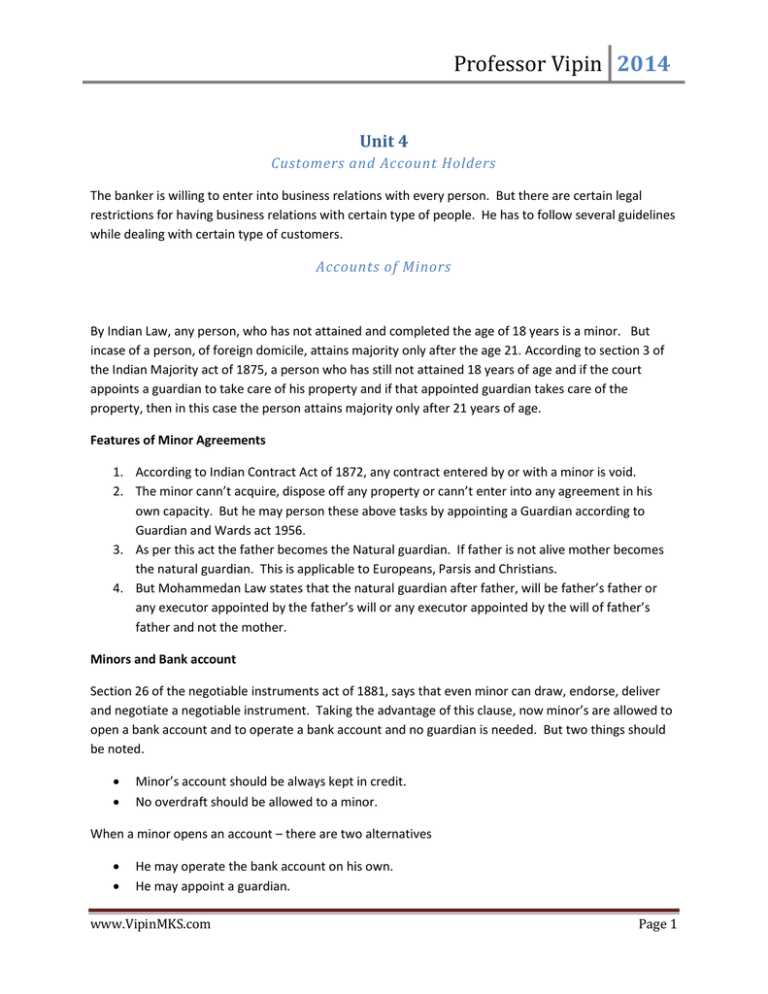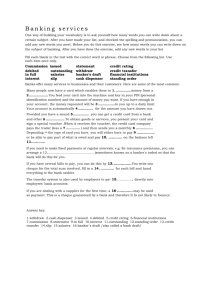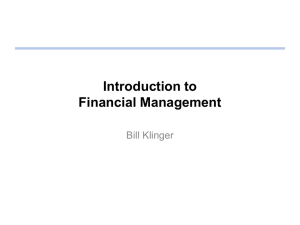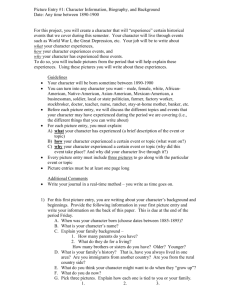Professor Vipin 2014 Unit 4 Customers and Account Holders
advertisement

Professor Vipin 2014
Unit 4
Customers and Account Holders
The banker is willing to enter into business relations with every person. But there are certain legal
restrictions for having business relations with certain type of people. He has to follow several guidelines
while dealing with certain type of customers.
Accounts of Minors
By Indian Law, any person, who has not attained and completed the age of 18 years is a minor. But
incase of a person, of foreign domicile, attains majority only after the age 21. According to section 3 of
the Indian Majority act of 1875, a person who has still not attained 18 years of age and if the court
appoints a guardian to take care of his property and if that appointed guardian takes care of the
property, then in this case the person attains majority only after 21 years of age.
Features of Minor Agreements
1. According to Indian Contract Act of 1872, any contract entered by or with a minor is void.
2. The minor cann’t acquire, dispose off any property or cann’t enter into any agreement in his
own capacity. But he may person these above tasks by appointing a Guardian according to
Guardian and Wards act 1956.
3. As per this act the father becomes the Natural guardian. If father is not alive mother becomes
the natural guardian. This is applicable to Europeans, Parsis and Christians.
4. But Mohammedan Law states that the natural guardian after father, will be father’s father or
any executor appointed by the father’s will or any executor appointed by the will of father’s
father and not the mother.
Minors and Bank account
Section 26 of the negotiable instruments act of 1881, says that even minor can draw, endorse, deliver
and negotiate a negotiable instrument. Taking the advantage of this clause, now minor’s are allowed to
open a bank account and to operate a bank account and no guardian is needed. But two things should
be noted.
Minor’s account should be always kept in credit.
No overdraft should be allowed to a minor.
When a minor opens an account – there are two alternatives
He may operate the bank account on his own.
He may appoint a guardian.
www.VipinMKS.com
Page 1
Professor Vipin 2014
When a minor decides to operate the account on his own, after attaining the majority, the account may
be continued. But the banker has to obtain a letter of confirmation from him on attaining majority,
confirming the balance to his credit.
If the minor decides to appoint a guardian, in this case after the minor becomes the major, a new
account will be opened in his name, and the guardian becomes “Functus Officio” and the operation of
the account by the Guardian shouldn’t be allowed.
To know the date of attaining majority, the banker will enter the date of birth of the minor in the ledger
at the time of opening an account.
Loans may be given to the minor but only for purchasing the necessaries of life, against the properties of
minor. In case the minor fails to repay the loan then, only the properties of a minor may be sued and
not the minor himself.
Minors as an Agent
In negotiable instruments act, no where it is stated that minors shouldn’t become an agent. Hence they
may become the agents of the principal and on behalf of the principal they may enter into contract with
any person, draw cheques… etc.,
For example: When a father authorizes his son to become his agent, then on behalf of the father, the
son may operate the account, issue and sign cheques.
Minor as a Partner
According to Indian Partnership act of 1932, a minor may be admitted to a firm as a parter and if minor
starts operating the bank account of behalf of the firm and operates the overdraft account in the bank,
then he is not liable to those third parties before he attains majority. On attaining the majority, he
should inform the firm within 6 months from the date of attaining majority, his willingness to continue
or withdraw as a partner.
If he fails to give his opinion, then the law presumes that he is willing to continue as a partner and he
will be considered as a general partner and he will be liable for all debts and obligations of the firm like
any other partner.
But till the minor becomes major, he cannot be admitted as full-fledged partner. But he may be
admitted as a profit and loss partner of the firm.
Others
1. A minor may hold a joint account with a major, but the minor can’t be sued for any damages or
obligations.
2. A minor cann’t become a guarantor for loan or trustee for trusteeship companies.
www.VipinMKS.com
Page 2
Professor Vipin 2014
Lunatics
As per Indian Lunacy act of 1912, any person with unsound mind is a lunatic and according to the Indian
contract act of 1872, any contract entered by or with a lunatic is invalid /void.
Hence the banker should never allow an insane person to open an account with him.
On the other hand if a person is sane, while opening the account, later become insane – in that case the
banker should suspend all the operation of the account held by the lunatic customer with immediate
effect. But while taking such decision the banker should go for some authentic information {either by a
court order or a medical certificate} and not by rumors.
The banker may honour the cheques and debit the account of the customer, till he gets the information,
about the insanity of the customer. Once he gets the authentic information, the banker must stop all
the operation. He can’t debit the account of a lunatic customer.
Only the receiver appointed by the court of law can operate the account of the lunatic. The banker can
debit the account for the cheques issued by the receiver.
The bank can also continue the operation of the account of the lunatic, if the lunatic proves that he is
not insane. But it must be certified by two doctors.
Insolvent
An insolvent is a person who has been adjudged as bankrupt by the court of insolvency. A bankrupt
cann’t enter into contract with any party so with the banker. A banker can’t open an account in the
name of an insolvent.
If a person becomes insolvent after opening the account with the banker, then the banker should stop
the operation of the account as soon as he receives the order and act according to the instructions given
by the receiver appointed by the court.
Pensioners
The banks collects and pays the pension to the pensioners as per the authority letter or pension
payment order received by the concerned treasury.
The pensioners belong to different categories. They are:
Central Civil Pensioners – who are retired from Central Government Jobs and All India Services.
Defence pensioners- retired from defence services.
Railway pensioners.
State Government retired pensioners.
Freedom fighters.
Judges retired from Supreme court and High court
www.VipinMKS.com
Page 3
Professor Vipin 2014
Member of Parliament
Member of Legislative Assembly
Precautions
1.
2.
3.
4.
5.
6.
7.
8.
To facilitate the disbursement of pensions, the pensioner is required to open an savings
bank or current account in the sole name of the pensioner and the pension to be credited to
bank account only and not paid in cash.
On the last day of the month, the bank credits the pension.
Tax should be allowed, if any, and credited to Income Tax department.
No Joint account or nomination facility or authorization should be allowed.
As and when the amount of pension increases as a result of hike in Dearness Allowances,
the bank should workout the raised amount of pension and credits the same to the
pensioners account.
The pension amount can be transferred from one bank to another once in a financial year at
a pensioner'’ request.
Life certificate once a year, in the month of November, has to be obtained.
a. Form A:- requisition from the pensioner to collect the pension.
b. Form B:- Non-employment declaration
c. Form F:- Non-remarriage declaration
Declaration form:- that reimbursement is permitted from the pensioner – if paid extra.
These above said forms should be obtained by the banker.
Deceased Customers
On the death of a customer, a banker has an obligation to pay the outstanding balances or the articles
lying in lockers to the rightful owner (legal heir). While discharging his duties, the banker needs to
follow certain guidelines. They are:1. Will: When a customer leaves any will, the person named in the will shall be treated as the legal
representative and all outstanding balances of an account and articles should be handed over to
him. Registration of the will is not mandatory and no stamp duty is payable.
2. Nomination: In case of accounts, where nominations have been made, the nominee shall be
such representative.
3. Succession Certificate: This succession certificate will be issued by the court of law. The holder
of the succession certificate will have the authority to collect the debt.
4. Letter of administration: When a deceased person leaves a will and if the assets are in the form
of articles or valuables, court will issue Letter of Administration, which cover money, articles and
valuables.
5. Probate: When a copy of a will is certified by the court – It is known as Probate.
6. Personal Law: In case the will or nomination is not given by the deceased, then decision will be
taken on the basis of personal law of the deceased.
www.VipinMKS.com
Page 4
Professor Vipin 2014
Non-Residents Accounts
The banker has to follow certain guidelines, while dealing with N. R. I. account because it involves
foreign exchange transactions. The Reserve Bank of India has given a separate guidelines called
“Exchange Control Manual”, which has to be followed by every authorised dealers {who are authorised
to deal in foreign exchange}.
Who is a N. R.I.?
A person becomes a Non-Resident Indian in the following cases.
a. When a person resides/stays abroad for employment, carrying on business, vacation…….etc., for
uncertain number of years.
b. An Indian Government employee posted abroad or deputed abroad on assignments or any
missions.
c. Any state government employee or public sector undertaking employee deputed abroad.
Where can the N.R.I account be maintained?
N.R.I account could be maintained only in those banks, which are authorized to deal in foreign
exchange. In case of N.R.I account, the permission of Reserve Bank of India is not needed for the
following purposes.
•
•
•
•
To open the N.R.I account (Whether it is Current, Savings or fixed account), no prior permission
of R.B.I is required except for Bangladeshi and Pakistani nationals.
For crediting these account with funds transferred from abroad through banking channels.
For crediting these account with interest earned thereon.
For repatriation of funds abroad from these accounts.
Types of N.R.I account
There are three types of N.R.I account could be opened. They are:
•
•
•
Non-Resident External Rupees Account (NRE a/c)
Non-Resident Ordinary Account (NRO a/c)
Foreign Currency Non-Resident Account (FCNR a/c)
www.VipinMKS.com
Page 5
Professor Vipin 2014
Non-Resident External Rupees Account (NRE a/c)
This scheme was started in February 1970. The main features of this account are:1. Under this scheme an account could be maintained by a N. R.I {whether it is Current, Savings
account, fixed deposit or recurring deposit}.
2. The unit of account is Indian Rupee
3. An account can be opened by the funds transferred by the prospective customer from the
country of residence.
4. When a N.R.I is on a temporary visit to India, by surrendering foreign currency, travellor’s
cheque or drafts or cheques
5. An account can be opened with zero balance before going abroad for employment.
6. Under this scheme, a Joint account can be opened in the names of two or more Non-Residents.
However, a Joint account can’t be opened in the names of a Non-Resident and a Resident
Indian.
7. Nomination facilities are available for NRE account. The nominee can be a resident Indian also.
8. There is no ceiling on amount remitted for credit to this account.
9. Money held in these accounts can be invested in the Unit Trust of India bonds, National Savings
Certificate or Government Securities etc.,
10. Balances in these accounts are freely repatriable outside India at any time at the prevailing rate
of exchange without reference to the Reserve Bank of India.
11. Banks are required to pay interest on Term Deposits specified by the R. B. I. from time to time
12. Balances held in these accounts are exempt from wealth tax for seven successive years from the
date of the account holder returning to India for permanent settlement.
13. Gifts made from balances in these accounts to close relatives in India are exempted from Gift
Tax.
Non Resident Rupees Ordinary Account {NRO A/C}
The salient features of this account are as follows:
1. An account could be opened under this scheme without the permission of R. B. I [whether it is
Current, Savings account, fixed deposit or recurring deposit].
2. An account under this scheme can be opened only in Rupees.
3. In the event of a resident India leaving India for taking up employment, business or vocation for
an uncertain period, the existing resident account will be designated as NRO account.
4. Joint account could be opened by a N.R.I. with a resident of India.
5. Banks are free to determine the rate of Interest on these deposits.
www.VipinMKS.com
Page 6
Professor Vipin 2014
Foreign Currency Non-Resident Account (FCNR a/c)
This scheme was introduced in 1975. The main features of this account are as follows:
1. Under this scheme account could be held only as ‘Term Deposits’ and not as Current or Savings
a/c.
2. The account could be opened only in a designated currency. They are:- England’s Pound,
America’s Dollar, Germany’s Mark, Japan’s Yen or Euro dollar.
3. The credit or remittance will be received in any one of the above currencies.
4. NRE account could be converted into NRO account.
5. Under this scheme, a Joint account can be opened in the names of two or more Non-Residents.
However, a Joint account cann’t be opened in the names of a Non-Resident and a Resident
Indian.
6. Different rate of interest is stipulated for deposits under different foreign currencies.
7. The interest will be credited in the same currency as the deposits.
8. This account enjoys tax benefits.
Accounts of Government Departments
Some of the government departments are permitted to open and to maintain accounts in the
commercial banks. The account opened in the names of the government department is in the nature
current accounts. The main function of the bank in regard to a government department are receiving,
paying, collecting and remitting the money on behalf of the government department.
Precautions to be taken by the Bank
1. The central government transactions are governed by the ‘Central Government Compilation
Treasury Rules and Account Codes’ and the State Government transactions are governed by the
‘State Financial hand Book’ of the concerned state. The banks should have the knowledge of
such rules before allowing them to open the account.
2. While receiving money on behalf of a government department – It should be received only
through a challan. The challan is prepared in duplicate or triplicate. If the challan is lost, no
duplicate to be issued. Only certificate has to be issued.
3. If a cheque on a local bank is accepted, instead of cash, the receipt for the same should be given
only after the cheque is realised.
4. While making the payment on behalf of the government department, the bank should ensure
that a claim for payment is made only in the prescribed format.
5. Certain government departments like forest department are authorized to have personal
deposit account in the banks. While dealing with such accounts the bank has to follow these
guidelines.
•
The personal deposit account should be treated and should be maintained on the lines
of current account.
www.VipinMKS.com
Page 7
Professor Vipin 2014
•
•
When such an account is opened, the details about the authority opening the a/c,
person authorized to draw cheques, withdrawal of money …..etc., has to be obtained
very clearly.
The validity of cheques issued on these accounts is three months.
Married Women
The Indian Contract Act of 1872 says that even a married woman should be treated like any other man
or unmarried lady. Hence she may open and operate an account, acquire, sell, dispose off property,
issue, draw and endorse a cheque.
Risks of a Banker While dealing with a Married Women:
1. A married women can’t be adjudicated as an insolvent.
2. She can’t be sent to prison for the non-payment of debts or loans or advances taken.
3. Her husband can’t be made liable for her personal debts. {except if she is acting as an agent of
her husband}. But if a loan or an advance is granted to a married women for getting necessaries
of life then husband can be held liable.
4. Married women may avoid the liability by pleading that she has not understood the nature and
implications of the contract.
5. Married women may avoid the liability by pleading that she was unduly influenced by her
husband to borrow or to enter into contract.
Precautions
1. While opening the account of a married women – name and address of her husband – his
employer’s details has to collected by the banker.
2. The account of married women should always be kept in credit. Loans or Advances may be
granted to her against any of her personal property, which are in her own title.
3. “Free Will” that she is not entering into contract by anybody’s force has to be obtained.
4. If she is a party of Joint account – clear mandate has to be obtained regarding who is authorized
to operate the account.
Joint Hindu Families or Hindu Undivided families (HUF)
Joint Hindu families or Hindu undivided family is a family, which comprises all male members descended
from a common ancestor for three successive generations. They may be Son, Grand Son, Great Grand
Son, their wives and unmarried daughters.
In other words Hindu Undivided Family is a family, which consists of more than one male member,
possesses ancestral property and carried on family business. It is a legal institution.
www.VipinMKS.com
Page 8
Professor Vipin 2014
In this family, the senior male member is called as ‘Karta’ and other male members are called as
‘Coparceners’. Karta manages the whole business of the family and his liability is unlimited. But
‘Coparceners’ liability is limited and they are liable only to the extent of their share in the family and
they don’t manage the business directly.
Female members cann’t manage the business. But mother can look after the business if there are no
male members. The Karta has the power to mortgage and to pledge the property of Joint Hindu Family
for raising loan for the business and not for his personal usage and Karta’s liability is unlimited and he is
jointly and severally liable for the loan taken.
Guidelines
a. The banker must get the complete information about the Joint Hindu Family including the
names of major and minor coparcenors. In Hindu Undivided Family a male member by birth
gets a right in the ancestral property. Hence the banker must get a declaration from the
Karta to this effect along with specimen signature and signatures of all coparcenors.
b. The name in which Hindu Undivided Family account is to be opened, the type of account
and nature of transaction to be ascertained. Clear mandate should be obtained regarding
the operations of that account. In the absence of any specific instructions, it has to be
operated by Karta only.
c. While making advances, the banker should ascertain the purpose for which the loan is
obtained. To be on the safer side the banker has to get both Joint and Several Liability.
d. If an advance or loan is given for personal usage then the coparcenors cann’t be held liable
for such debts, even if loan is made for starting a new business. But if the business is
started by the Karta, then all the coparcenors are liable for such debts, to the extent of their
share in the family.
e. Karta has unlimited liability but the liability of coparcenors is limited to their share in the
family.
Trustee Account
Section 3 of the Indian Trust act of 1882 defines a trust as “An obligation annexed to the ownership of
property arising out of confidence reposed in and accepted by the owner for benefit of another and the
owner”.
The person who reposes the confidence is called the ‘Author of trust’. The person on whom the
confidence is reposed is “A Trustee”. A person for whose benefit trust is formed is a ‘Beneficiary’.
Trust Deed
It is the document by which trust is formed and trust property is entrusted to the trustee. In dealing
with trust deeds banker has to take following precautions. They are: -
www.VipinMKS.com
Page 9
Professor Vipin 2014
a. To ascertain the powers and functions: The banker should thoroughly examine the trust deed to
ascertain the powers and functions of trustees. The trustees are authorised to act jointly and
cannot delegate their powers unless trust deed authorises them to do so.
b. The account opening form should be signed by all trustees: It is necessary that the all the parties
of a trust must sign the account opening form. The account opening form must be enclosed
with a copy of registration certificate. Along with it a copy of the resolution passed in the
meeting of trustees to open the account should be obtained.
c. Operation of the account: In case of two or more trustees, the banker should ask for clear
instructions regarding person (s) who shall operate the account. In the absence of such
instructions all trustees should sign the cheque and any one of the trustees can countermand
the payment.
d. Specimen Signature: The banker should take signature of person (s) who operate the account.
e. Safeguard the interest of beneficiary: The banker should take precautions to safe guard the
interest of beneficiary of trust. Failing which he will be liable to compensate for any fraud on
the part of trustees. For example: if banker permits transfer of trust money to the personal
account of trustee.
f. No implied powers to borrow: The banker should examine the trust deed before granting
advance, as trustees have no implied powers to borrow, pledge or mortgage trust property
unless deed specifically confers such powers. To be on the safer side, the banker should insist
on personal security along with creating a charge of trust property.
g. Insolvency: The banker needn’t suspend the operations of trust account on the receipt of notice
of insolvency of any of the trustees, as it doesn’t affect a trust property. Any personal loan of
the trustee cannot be set-off by the trust funds. Even the trust property cannot be taken as
security for the loans raised by any trustee in his individual capacity.
h. Death, Insanity and Retirement: If one or more trustee die or retire, the authority vested in
remaining trustees depends on the provisions of trust deed. When all trustees are dead, the
court appoints new trustees but till such time, the banker must stop operating the account.
Executors and Administrators
Some people, instead of creating a ‘Trust’ to manage their property, prepare a ‘Will’ and specify in it the
name of the person, who will manage their property after their death. The person so named in the will
is known as ‘Executor’.
If no one is appointed as an ‘Executor’, then the court will appoint a person to look after the properties
of the deceased person. This officially appointed person is known as ‘Administrator’. When an
‘Administrator’ is appointed by the court of law – he will be given with a ‘Letter of administration’,
which will authorize him to manage the property of the deceased person.
In both the cases the maker of the will is known as ‘Testator’. The following are the guidelines to be
followed by the banker while dealing with executors or administrators.
www.VipinMKS.com
Page 10
Professor Vipin 2014
1. On the receipt of notice of death of the ‘Testator’, the banker must stop all the operation of the
Testator’s account.
2. Before allowing the executors or the administrators to operate the account the banker must
obtain probate or Letter of Administration by the concerned person.
3. When the official probate or letter of administration is produced by the executors or by the
administration – the banker must examine it carefully and should file a copy of the same for
future reference.
4. The banker must close the account of the Testator and open a new account in the name of the
executor or administrator and should transfer all the funds of the ‘Testator’.
5. If two or more than two executors or administrator are appointed – the banker should open a
joint account and should get clear instructions – get the mandate, regarding the operation of
account and that mandate should be necessary obtained in writing. Any one of the executor or
administrator can issue countermanding.
6. No executor should be permitted to borrow against pledging or mortgaging the property of the
deceased person. The executor can borrow in his personal capacity.
7. The funds borrowed cann’t be misappropriated by the executor or administrator. Hence the
banker shouldn’t honour those cheques drawn in favour of the deceased to the credit of the
private account of any executor.
8. If an executor or administrator is borrowing funds for maintaining the property of the deceased
– the property cann’t be made liable for such debts. It shall be in the personal capacity of the
executor or administrator.
9. If an Executor is declared as insolvent – he may be still permitted to operate the account.
10. But in case the executor or administrator becomes insane or in case of death, the banker will
stop all the operation of the account with immediate effect.
11. The banker cann’t exercise his right of set-off against credit balance in executor’s personal
account in respect of debit balance in account of deceased.
Joint Account
A joint account is opened in the names of two or more persons. While dealing with joint account, the
banker has to take several precautions. They are:1. When a joint account is opened, the banker should make sure that, all the members of a joint
account are adult. Even a minor can also be admitted as a partner of a Joint account, the banker
should be careful while dealing with such account, because as we know any contract entered with or
by a minor is void.
2. The banker should permit the opening of a joint account only if the joint account application for
opening the joint account is signed by all the persons interested in the joint account.
3. The banker must clear instructions regarding the ‘Mode of Operation’ of the Joint account –
whether it will be operated by all the parties of a joint account or whether they are authorizing a
person to operate the account. The person authorized to operate a joint account is known as
www.VipinMKS.com
Page 11
Professor Vipin 2014
4.
5.
6.
7.
8.
9.
10.
11.
12.
“Delegatee”. This delegatee may be a member of joint account or even an outsider. But this
delegatee cann’t delegate (Transfer) the authority to another.
When a person or persons are delegated to operate a joint account, the banker must get the clear
instructions, in writing, signed by all the joint account holders.
In the absence of these special instructions – the banker should honour only those cheques, which
are signed by all joint account holders. Specific authority is given to over draw joint account. Bank
should insist that loan document is to be signed by all joint account holders.
In case of settling the credit balance, to be on the safer side, the banker should permit the opening
of a joint account under clause “Payable to either or survivor”. When a joint is opened under this
clause, the banker can pay the balance in the joint account to the surviving joint account holder on
the death of one of the joint account holders. In such case, the banker asks the surviving account
holder to withdraw the balance in the joint account and deposit it in an account opened in the name
of the surviving joint account holder.
Full name of the account must be given in all documents furnished to banker, even if the account is
to be operated by one or few of joint account holders.
In case of debt balance, the banker creates both Joint Liability and Several Liability
The authority given to a authorized person or delegatee may be revoked (withdrawn) by any joint
account holder. It is automatically revoked if any account holder, die or becomes insane or declared
as bankrupt. The banker must immediately stop payment.
On the receipt of the notice of the insanity of any one of the joint account holder, the banker should
stop the operations on the joint account. If there is any debit balance in the joint account, he can
proceed against the sane joint account holders and legal representatives of the insane joint account
holder. On the other hand, if there is any credit balance in the joint account, it should be disposed
of as per the joint instructions given by the sane joint account holders and the legal representatives
of the insane joint account holder.
The credit balance of the joint account opened in the names of the husband and his wife should be
paid to the husband, if the wife dies and the husband survives. However, if the husband dies and
the wife survives, the credit balance in their joint account should be paid to all the legal heirs i.e.,
the wife and the other legal heirs of the deceased husband and not to the surviving wife alone.
On the receipt of the notice of the death of any one of the joint account holders, it is advisable for
the banker to stop the operations on the joint account. If there is any debit balance in the joint
account, he can proceed against the surviving joint account holders and legal representatives of the
deceased joint account holder. If there is any credit balance in the joint account, the banker should
dispose it of in accordance with the specific instructions received from the joint account holders at
the time of opening of joint account. In the absence of any specific instructions, the banker has to
pay the balance jointly to the surviving joint account holders and the legal heirs of the deceased
joint account holder.
www.VipinMKS.com
Page 12
Professor Vipin 2014
Partnership Firms
Section 4 of the Indian Partnership Act of 1932, states that “a partnership is a relation between persons
who have agreed to share the profits of a business carried on by all or any of them acting for all”.
A partnership firm is formed by an agreement among the partners called a ‘Partner Deed’. While
dealing with a partnership firm, the banker should take the following precautions:Guidelines
1.
2.
3.
4.
5.
6.
7.
8.
9.
10.
The banker should not open a firms account in the name of partners or partner. He should
open only in the name of partnership firm.
Although a banker can open a partnership account in the firm’s name at the request of one
or more partners, the banker in his own interest should insist that all the partners sign the
account opening form.
The banker should obtain a copy of partnership deed to ascertain the name of the firm,
names and addresses of partners, nature of firms business etc., If there is no partnership
deed, the banker should obtain a partnership letter signed by all the partner to ascertain
this information.
The banker has to open a mandate singed by all the partner or partners, who are authorised
to operate the firms account and also the powers given to them to operate {power to
operate or to overdrawing facility}
The banker should obtain specimen signature of all authorised partner (s). If no specific
partner is appointed, then the banker should get the specimen signature of all the partners
of the firm. The banker should honour only those cheques drawn and signed by authorised
partners or all partners.
The banker should see that the funds of the firm do not go to the personal account of a
partner.
Before granting an advance, the banker should ascertain the credit worthiness of the firm by
examining its audited balance sheets of the previous years.
In case of trading firm, though every partner has an implied authority to borrow on behalf of
the firm, unless he is prohibited by the partnership deed, it is advisable for the banker to get
the consent of all the partners before granting advances.
When an overdraft facility or loan is granted to a firm, it is in the interest of a banker to take
an undertaking from all the partners to repay the advance jointly. This will enable the
banker to set-off the credit balance of personal account of any partner against the debit
balance of the firm.
If an advance is granted to the firm against the pledge of firm is property, the banker should
insist that all partners sign the documents creating the pledge. The Managing partner may
pledge the property of a partnership firm.
www.VipinMKS.com
Page 13
Professor Vipin 2014
11.
12.
13.
14.
15.
16.
As per the Partnership Act, no partner can bind his co-partner by giving a guarantee on
behalf of the firm. Therefore the banker should ensure that the guarantees executed by all
the partners of the firm when he accepts it.
On the admission of a new partner to the firm, the banker should close the account of a firm
and open a new account of the firm, which is reconstituted. The banker should obtain a
new mandate from the reconstituted firm stating the mode of operation of the account.
Retirement: On the receipt of notice of retirement of a partner, the banker should close the
old account and open a new one in the name of a reconstituted firm, in case the firm’s
account shows a debit balance. A retiring partner also retires from all liabilities. It is also
necessary to obtain a fresh mandate from the partners stating the mode of operation of the
account.
Death: After the receipt of notice of death of partner, the banker should not honour the
cheque drawn by him without getting confirmation of the remaining partners. Successors of
the deceased cann’t become the partners, instead they may claim their share. It is
preferable to close the old account and open a new one in the name of a new firm.
Insolvency: On the receipt of insolvency of a partner, the banker should stop payment on
cheque if the firm’s account shows a debit balance. The banker should close the old account
and open a new one. This is necessary to preserve his rights to proceed against the estate of
the insolvent partner for the debit balance. If this step is not taken, the rule in clayton’s
case applied {the first debit will be appropriate by the first credit}.
Lunacy: On the receipt of the notice of lunacy of a partner, the banker closes the old
account and opens a new account in the name of reconstituted firm. If the firm’s account
shows a debit balance the banker then can proceed against the legal representatives of the
insane partner for the debt due from him. If this step is not taken the rule in clayton’s case
applied {the first debit will be appropriate by the first credit}.
Clubs, Societies, Charitable institutions and other non -trading associations
These including schools, colleges etc maintain their account in the banks. The banker has to take the
following precautions in dealing with them: 1. The society must be incorporated: The banker should ensure that the applicant society is a
properly incorporated as the unregistered society cannot be sued in law. The society be it a
club, school or any other institution registered under ‘The societies registration act of 1860’ or
they may be also incorporated under companies act of 1956 or co-operative societies act. In the
absence of such registration, the society will have no legal existence and will have no
contracting powers.
2. Rules and by-laws of the societies: A registered society is governed of the act under which it has
been registered. They have their own constitution, chartered or memorandum of association
and rules and by law to carry on its activities. A copy of the same to acquaint himself with the
powers and functions of the persons and managing the affairs.
www.VipinMKS.com
Page 14
Professor Vipin 2014
3. Resolution of Managing committees: For opening a bank account, the managing committee of
the society must pass the resolution, through which appointing the bank concerned as a banker
of the society, mentioning the name and date of the persons who are authorized to operate the
account will be decided. The bank for its own record must obtain a copy of this resolution.
4. Death or Resignation: In case the person authorised to operate the account, dies or resigns, the
banker should stop the operation of the account till the managing committee nominates,
another person to operate its account.
5. Borrowing power of society: In case a registered society intends to borrow, the banker must
ascertain the borrowing power of the society from its charter or memorandum. The purpose for
which such borrowing is permitted must be noted and the power of the managing committee or
its office bearers to create a charge over the assets of the society for the purpose of borrowing
should be enquired. A resolution must be passed by the managing committee, for this purpose
and certified copy thereof must be given to the bank.
6. Care to be exercised in case of personal account: If the person authorised to operate the
societies account is also having his personal account with the same branch of the bank. The
banker is under an obligation to ensure that the funds of the societies are not be credited to the
personal account of the said person or office bearer. If he fails to do so, the banker will be held
guilty of negligence and shall not be able to avail such statutory protection under section 131 of
the negotiable instrument act of 1881.
Joint Stock Companies
A Joint Stock Company is an association of persons registered under the company act of 1956. It is legal
entity and an artificial person created by law.
Features of Joint Stock Company
1. It is a legal person because it is created by law.
2. It is an artificial person and not a natural person. It cannot by itself put a signature on the
document. Hence for this purpose we have a common seal on which the name of the company
is engraved.
3. Joint Stock Company has to function through natural persons called Directors.
4. The liability of its members is limited to the extent of their share in Joint Stock Company
5. It has a separate existence, which is quite different from its members. The life of Joint Stock
Company will not get affected by the death, insolvency or insanity of its members. Hence it has
a perpetual or continuous existence.
6. As a legal person – it can enter into contracts, own, buy, sell properties, can sue and can be sued
in its own name.
www.VipinMKS.com
Page 15





